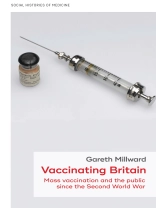This electronic version has been made available under a Creative Commons (BY-NC-ND) open access license. This book is available as an open access ebook under a CC-BY-NC-ND licence.
Vaccinating Britain shows how the British public has played a central role in the development of vaccination policy since the Second World War. It explores the relationship between the public and public health through five key vaccines – diphtheria, smallpox, poliomyelitis, whooping cough and measles-mumps-rubella (MMR). It reveals that while the British public has embraced vaccination as a safe, effective and cost-efficient form of preventative medicine, demand for vaccination and trust in the authorities that provide it has ebbed and flowed according to historical circumstances. It is the first book to offer a long-term perspective on vaccination across different vaccine types. This history provides context for students and researchers interested in present-day controversies surrounding public health immunisation programmes. Historians of the post-war British welfare state will find valuable insight into changing public attitudes towards institutions of government and vice versa.
表中的内容
Introduction
Part I: The development and evolution of the vaccination programme 1 Diphtheria 2 Smallpox 3 Poliomyelitis
Part II: Vaccination crises 4 Pertussis 5 MMR Conclusion Index
关于作者
Gareth Millward is a Wellcome Trust Research Fellow at the Centre for the History of Medicine at the University of Warwick












